1. Winter –season that bestows healthiness
During the winter season, the pores on our skin contract due to which the inner digestive fire gets trapped inside the body and it stokes up. In Ayurvedic terms, immunity is connected with digestion. When digestion is good as a result of the strengthened digestive fire, and appetite is good, then the immunity is also strengthened. Winter is the season when nature is ready to nurture us. This is why during these 4 months our health naturally stays in a good condition.
2. Diet routine as per the season
2A. What should one eat and avoid eating during winter season?
Due to the digestive level being very high, any type of food item gets easily digested in the winter season. Therefore there are not many dietary restrictions to be followed in this season. Since the nights are of longer duration, one feels hungry as soon as one wakes up in the morning. Therefore Ayurveda prescribes that one should eat to its stomach full soon after freshening up in the morning. Dryness increases in the winter season, hence oily food items like sesame seed, groundnut and coconut should be consumed in good quantity. This is why it is customary to distribute Til-gul during the winter. One should eat nutritious food during this season and strengthen ones’ health. Eating intermittently throughout the day is harmful to health, therefore one should eat to its stomach full twice a day as per pre-planned timing so that one does not feel hungry at the odd times. Betel leaf can be chewed post meals for better digestion. One should avoid eating food items like puffed rice which digests quickly causing one to feel hungry again.
2B. Water
During these days, water from the natural and clean sources e.g. wells, springs etc. is naturally pure. Drinking water from these sources post filtering does not cause any harm. Those unable to digest cold water only are required to drink hot water. Water available in the cities, however, could get contaminated due to pollution and should therefore be filtered and boiled before drinking.
2C. Cooler water is harmful for health
Drinking water from refrigerator or water cooler is harmful to health in any season. Drinking such water can decline your digestive power and cause cough, colds, joint pains and laziness.
3. Other conducts during winter season
3A. Getting up early in the morning
During the winter season even though one feels like sleeping for an extended period due to the cold weather, one should still get up early in the morning, around 1.5 hours before sunrise. This habit of getting up early in the morning every day itself will keep diseases away.
3B. Inhaling medicinal vapours
Medicinal vapours should be inhaled after brushing the teeth in the morning. This prevents cough and colds from occurring. Thymol seeds powder should be placed in a paper roll. The paper roll should be then lighted at one end and 3 puffs should be inhaled from the other end. Instead of exhaling the medicinal vapour from the nose, one should exhale it from the mouth along with the breath. Tulsi (Basil) leaves powder can also be used instead of Thymol seeds.
3C. Apply oil regularly to the body before bathing
In the winter season, one should regularly apply coconut oil, sesame seed oil, groundnut oil or mustard oil to the body before bathing. This prevents the skin from becoming dry and itchy due to the cold weather. It also prevents cracking of skin, lips and heels. Coconut oil is cold whereas mustard oil is warm. Even then, using coconut oil in winter season does not cause any harm. Coconut oil proves beneficial for those suffering from heat related disorders. Instead of using artificial and costly cosmetics like Petroleum Jelly and Cold Creams, using economical and natural oil is more beneficial for the health of our skin.
3D. Exercises
One should perform rigorous exercise and physical work during the winter season. It is ideal to exercise after massaging oil to the body in the morning and then having a bath after half hour, however the time can be altered based on one’s convenience. Only restriction is to not bathe immediately within half an hour after exercising.
3E. Bathing
One should bathe with hot water in winter season, however those habituated with cold water can continue bathing with cold water as it does not cause any harm to the body.
3F. Clothes
Warm clothes should be worn to protect ourselves from cold weather.
4. Simple Ayurvedic remedies for
general ailments occurring in winter season
4A. Cough, colds and fever
Take 2 glasses of water and add a fist full of Basil leaves to it. Boil the water till only 1 glass of water remains. Consume half portion of this liquid in the morning and remaining half in the evening, everyday till the ailment goes away.
4B. Joint pain
Take fist full of flowers and leaves of Parijatak as mentioned above boil them in water and consume the liquid in the morning and evening. Massage any type of oil to the paining joints. Increase the quantity of oil and ghee consumed along with the food.
4C. Constipation
Mix one spoon of Hirda powder with 1 pinch of Pimpli powder and consume it every day with empty stomach in the morning. If this is continued regularly till end of March, it results in good health.
5. Avoid these acts strictly
Walking in the dew or in the night, not protecting self from cold weather, getting wet in the sprinkle of water, constantly bearing the flow of air from the running fan, sleeping during the day time should be strictly avoided. This results in increase of phlegm in the body giving rise to diseases.
I pray to the holy feed of Deity Dhanvantari that let all seekers become healthy by following the seasonal regimen as prescribed for winter season and let everyone develop faith in Ayurveda.
– Vaidya Meghraj Paradkar
6. Causes of common cold and its treatment
The main culprit for causing common cold is the germ called ‘Virus’. Although common cold happens due to germs, it materializes when there is a decrease in overall immunity of the body (inner skin of nose).
Over exertion, weakness in the muscles and tendons, indigestion, frequently getting wet in rains, regularly getting wet in cold water, swimming, sleeping in air-conditioned room, high consumption of ice-creams or cold drinks, sudden change in the weather condition, working in humid or dusty environment etc. are the causes for decrease in the immunity of our body.
Symptoms of common cold
There are two stages of common cold
Liquid-like, watery common cold (sneezing, blocking of nose, tastelessness, decrease in appetite, running nose etc.)
Ripe common cold (dense phlegm gets thrown out from nose frequently, after a period of time its quantity reduces, later then the headache reduces and heaviness in the body also goes away)
General treatment
- Apply paste of saffron and flagroot to the areas around the nose and on the forehead.
- Cover nose and head while sleeping and wear footwear in the day time.
- Heat mustard, thymol seeds or flagroot powder on a pan, tie it in a handkerchief knot and hold it close to the nose.
- Inhale water vapour from the nose of a kettle. Inhale eucalyptus oil or garlic intermittently.
- Turmeric powder should be mixed in 1-2 teaspoonful holy basil leaves syrup and tasted frequently.
- Extract made from dry ginger, black pepper, long pepper, holy basil leaves, cinnamon, lemon grass should be consumed.
- Take tablets of Tribhuvankirti Ras or Anandbhairav Ras in case of fever or body ache.
- Consume light food or fast if possible. Rice soup with dry ginger, black pepper, long pepper added to it or soup of green gram or kulith or extract of radish can be consumed.
Treatment for second stage common cold
- Add dry ginger to milk, boil and drink it.
- Consume dry items such as chickpea and barley.
- Mix Shathi, Indian gooseberry powder, long pepper, Pimplimul, dry ginger, black pepper with ghee and honey and consume it.
- Take 1 teaspoon of Chitrak Haritaki Avleha twice a day for 1 month.
- As per Ayurveda, generally 4 types of common cold are found. Symptoms related to these four types and its corresponding treatment for first and second stage are prescribed by Ayurveda.
- If common cold has occurred due to allergy or sinus, the treatment has to be given accordingly. However antibiotics have no effect on the disease. If common cold advances to next stage and there is a constant recurrence of fever, then one should consult a doctor.
Reference : Diseases of respiratory track, Author – Dr. V. B. Athavale and Dr. Kamlesh V. Athavale
Three causes of diseases
1. Asamtyendriyarth sanyog
‘असात्म्य’ means one which we are not used to or are allergic to. The food which we can digest and has no adverse effect on us is ‘सात्म्य’. Everyone has this tendency. With ‘सात्म्येंद्रियार्थ संयोग’ our daily routine remains in balance. With ‘असात्म्येंद्रियार्थ संयोग’, imbalance gets created. We can comprehend the physical world through sense of touch. The effect of the physical world is perceived through the sense of touch. This means that effect on each sense organ merely happens through touch. This principle is very important. We can comprehend through touch. The effect of this comprehension happens on each and every smallest part of the body including the molecules. If the intake through five senses too high, impure, too less or nil then it has an effect on the routines of the body and causes imbalance in proportion of wind, bile and phlegm and also on the psychological health. This imbalance invites diseases. The ‘असात्म्येंद्रियार्थ संयोग’ has an effect externally on physical body as well as internally right up to the mind.
2. Pradnyaparadh
This offence happens in the mind through the medium of mind itself. Hence its effect is on the mind. ‘प्रज्ञापराध’ means the offence which is done willingly, in a headstrong manner, not giving due consideration to emotional aspects or human attitude and is against any moral values. Audaciousness, too much of closeness with women, insulting others and saying bad words to anyone at any time and place, eating unadvisable items and consuming alcoholic drinks etc. fall under this category. These things first affect the mind and then our body. ‘प्रज्ञापराध’ imbalances the triple disorder (wind, bile and phlegm). ‘प्रज्ञापराध’ results in psychological disorders (Raja and Tama) as well as physical disorders.
3. Effect of time
Time means effect. Rain, cold, hot, day, season etc. causes disorders.
‘परिणामः काल अण्यते ।’
Meaning : Once time progresses, its effect matures.

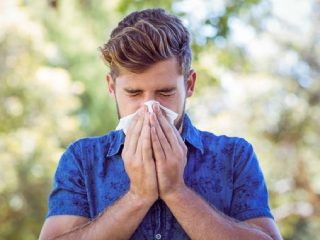 Are you distressed with constant sneezing ?
Are you distressed with constant sneezing ?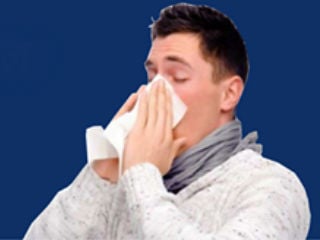 Simple Ayurvedic remedies for common ailments in winter
Simple Ayurvedic remedies for common ailments in winter Health tips for Vasant (spring) season
Health tips for Vasant (spring) season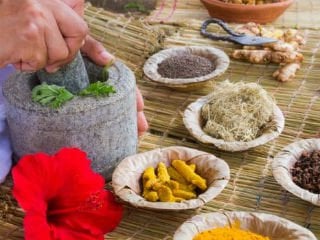 Code of conduct to be followed in winter
Code of conduct to be followed in winter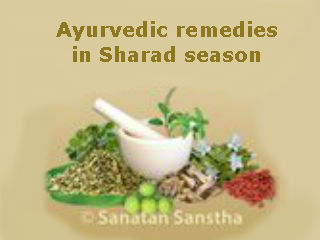 How to stay healthy in Autumn (Sharad ritu)?
How to stay healthy in Autumn (Sharad ritu)?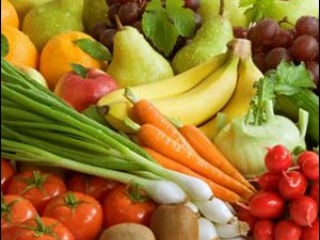 Factors responsible for causing diseases in rainy season
Factors responsible for causing diseases in rainy season